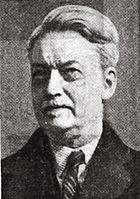
The Range of Reason
Encyclopedia

Catholic
The word catholic comes from the Greek phrase , meaning "on the whole," "according to the whole" or "in general", and is a combination of the Greek words meaning "about" and meaning "whole"...
philosopher
Philosophy
Philosophy is the study of general and fundamental problems, such as those connected with existence, knowledge, values, reason, mind, and language. Philosophy is distinguished from other ways of addressing such problems by its critical, generally systematic approach and its reliance on rational...
Jacques Maritain
Jacques Maritain
Jacques Maritain was a French Catholic philosopher. Raised as a Protestant, he converted to Catholicism in 1906. An author of more than 60 books, he helped to revive St. Thomas Aquinas for modern times and is a prominent drafter of the Universal Declaration of Human Rights...
and published in 1952. The text presents a Thomist
Thomism
Thomism is the philosophical school that arose as a legacy of the work and thought of St. Thomas Aquinas, philosopher, theologian, and Doctor of the Church. In philosophy, his commentaries on Aristotle are his most lasting contribution...
philosophy regarding religion
Religion
Religion is a collection of cultural systems, belief systems, and worldviews that establishes symbols that relate humanity to spirituality and, sometimes, to moral values. Many religions have narratives, symbols, traditions and sacred histories that are intended to give meaning to life or to...
and morality
Morality
Morality is the differentiation among intentions, decisions, and actions between those that are good and bad . A moral code is a system of morality and a moral is any one practice or teaching within a moral code...
. It contains a study of Atheism, titled The Meaning of Contemporary Atheism, which has had a considerable impact on Catholic views of Atheism.
On Human Knowledge
In this essay, Maritain considers empiricist epistemology. While he acknowledges that sense-data plays an important part in human knowledge of the world, he rejects the thesis that the real does not exist or cannot be known, because he believes that the intellect can transcend sensory experience to perceive the noumenal worldNoumena
Noumena is a melodic death metal band from Finland. The band's name comes from the word noumenon, a philosophical term used by Immanuel Kant. The band consists of five members: vocalist Antti Haapanen, guitarists Tuukka Tuomela and Ville Lamminaho, bass guitarist Hannu Savolainen and drummer Ilkka...
.
On Artistic Judgement
Maritain here supports the theory that the aesthetic carries a "hidden truthTruth
Truth has a variety of meanings, such as the state of being in accord with fact or reality. It can also mean having fidelity to an original or to a standard or ideal. In a common usage, it also means constancy or sincerity in action or character...
", as an expression of the fundamental individuality of the artist
Artist
An artist is a person engaged in one or more of any of a broad spectrum of activities related to creating art, practicing the arts and/or demonstrating an art. The common usage in both everyday speech and academic discourse is a practitioner in the visual arts only...
.
The Meaning of Contemporary Atheism
Maritain introduces various terms to distinguish the beliefs of atheistsAtheism
Atheism is, in a broad sense, the rejection of belief in the existence of deities. In a narrower sense, atheism is specifically the position that there are no deities...
. These terms are:
- Absolute atheist - one who denies the existence of the god in whom believers actually believe
- Negative atheist - one who rejects the idea of GodGodGod is the English name given to a singular being in theistic and deistic religions who is either the sole deity in monotheism, or a single deity in polytheism....
- Positive atheist - one who challenges all aspects of God and is an antitheistAntitheismAntitheism is active opposition to theism. The etymological roots of the word are the Greek 'anti-' and 'theismos'...
- Practical atheist - one who claims belief in God, yet whose actions contradict this claim
- Pseudo-atheist - one who claims atheism, but unconsciously believes in God
- Real atheist - one who denies the existence of God and follows a pseudo-morality rather than Divine lawDivine lawDivine law is any law that in the opinion of believers, comes directly from the will of God . Like natural law it is independent of the will of man, who cannot change it. However it may be revealed or not, so it may change in human perception in time through new revelation...

